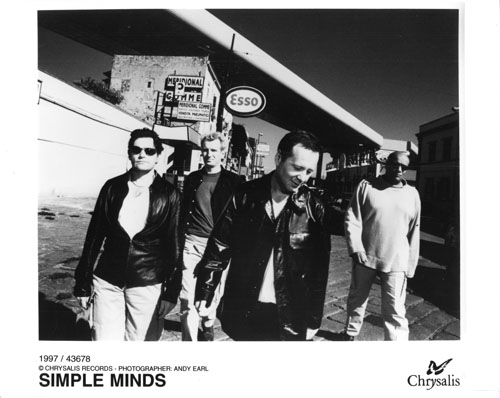|
simple minds going back to their roots
Simple Minds have come home - and the results sound better than ever. It's been a long journey, but a band which was arguably
one of the first Euro rock acts, employing hard industrial funk grooves, driving bass lines and repetitive codas, has abandoned its love
affair with America to return to its European roots.
The result is a return after a three-year absence with a new label and new material which is undoubtedly their best work of the
Nineties and could yet see them return to the stadiums which they once dominated.
A sample of tracks from the as-yet-untitled new album, their 13th in a 20-year career,
demonstrates a denser, more textured sound underpinned by a definable groove. Simple Minds haven't gone dance, but they have gone
back to their roots.
Singer Jim Kerr says, "I can hear echoes of the past.
The last album was a straightforward rock record recorded in America,
whereas this one is quite the contrary. It's more European, by which I mean it's more atmospheric, more experimental and not as
full on."
"In the past few years a lot of people have been in touch with us about sampling our early material or remixing it," he adds.
"Back then some of it was very groove laden, there was a lot of synthesisers and beat boxes on tracks like
I Travel,
Love Song and
Theme For Great Cities."
One of those acts was Utah Saints who covered New Gold Dream on their 1993 album
and are currently working on a remix of I Travel for the band. Jez Willis of the
Utah Saints says, "Simple Minds were a really groundbreaking act when they started off. They had a pop sensibility but
mixed electronics and guitars which was an influence on what we do. I Travel captured the
Munich club sound and the European dance scene. It was a really great dance record and it will be again."
The tentative plan is for I Travel to feature as a formatting device on a single release,
but if it's successful it could be given a club release. However, the band and Chrysalis A&R Chris Briggs - who has known
the band since the early Eighties - stress that it's only an experiment and that the real impetus for change came from within the band.
Briggs adds, "The new record sounds fresh and new to me. I like it a lot and I'm pleased
with the way it sounds. They've not brought in some kids to do it for them, they've figured it out for themselves, like musicians."
Kerr says, "A lot of bands of our generation have imported the trendy DJ or producer, but we
felt we had that inherently and it was just a matter of bringing it to the forefront again. In a way the old backbeat of bass, drums
and guitar has been nailed for so long that you need a fresh approach."

Two years in the making, the new album began life in Kerr and the band's other
long-time member Charlie Burchill's Perthshire studio and took shape at studios
in Capri, Paris and Dublin aided by Peter Walsh and
Derek Forbes, the team who produced and engineered
New Gold Dream (81, 82, 83, 84) - their 1982 breakthrough set.
Burchill turned increasingly to modern recording technology, including software packages
like Pro-Tools to build up the dense atmospherics of tracks like
War Baby [sic] and
Glitterball, the two songs vying to be the first single release in mid-February.
The duo parted from Virgin but stayed within the EMI Group at Chrysalis largely due to the efforts of
president and CEO Jean-Francois Cecillon. He says, "When I signed them I signed them for the world, not just for the UK,
and that's what matters to me. They are very big in Europe especially in France and Germany and as a Frenchman I recall them
playing big venues and having hit records. I understand this band and their music, I'm a fan and I wanted them to remain with us."
Despite its poor critical reception, their last album Good News From The Next World
reached number two in the UK in 1995 and was certified gold, going on to sell 1.6 million copies worldwide, dispelling any doubts
about the band's saleability. Given that its release coincided with The Stone Roses' Second Coming the simple
conclusion was that perhaps their time had passed. Kerr says, "I guess there was a feeling
of flatness with the last album, things didn't go as well as expected. There was a degree of over-familiarity, it's fair to say,
but the way I see it is if you have a career with some longevity there are going to be ups and downs and I wasn't in any way
disheartened."
He refuses to be drawn on whether they can overturn prejudices that now exist among the press and possibly radio. "We have a
fanbase, but we have to go and see what the reception is, we're taking nothing for granted. Maybe the music press won't race
to put us on the cover but I'm not going to be involved in a 'them and us' situation. If people want to like it fine, if not,
so what? It's not my job to fret about those things."
Cecillon adds, "The only credibility to me is whether you sell records. When you've been a superstar act once you're a
superstar act forever."
Mike Pattenden
Dotmusic, December 1997
This article was first published on the DotMusic website in December 1997 and was also reproduced in full on the back of
the Neapolis presenter.
|



